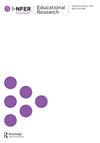Conceptualisation of students’ school-related wellbeing: students’ and teachers’ perspectives
IF 2.6
3区 教育学
Q1 EDUCATION & EDUCATIONAL RESEARCH
引用次数: 6
Abstract
ABSTRACT Background Converging evidence points to the relevance of adolescent wellbeing as a resource for positive development and successful learning. As schools represent one of the most significant environments for adolescent development, there is increasing interest in students’ wellbeing in schools. However, the growing body of research reveals great heterogeneity regarding operationalisations of school-related wellbeing. Purpose The present study aims to contribute to the conceptualisation of the construct by taking a closer look at experiences within the context. In doing so, it takes a multi-informant approach and explores students’ and teachers’ perspectives. Method A survey was conducted among secondary school students (n = 150) and teachers (n = 197). Participants provided responses to open-ended questions, addressing their general understanding of the construct and indicators of high and low levels of school-related wellbeing. Data were analysed using a qualitative content analysis approach. The EPOCH model of Kern et al., with the dimensions Engagement, Perseverance, Optimism, Connectedness and Happiness, was applied as a categorisation framework. For coded segments that did not correspond to the EPOCH domains, the category system was expanded inductively. Findings Just over three quarters of all coded segments referred to the EPOCH domains. Three categories were inductively added: Physical health, Achievement and Framework conditions. Overall, in terms of the content addressed as well as frequencies of the themes, there was a degree of homogeneity across the responses of students and teachers, although findings suggested greater emphasis on eudaimonic aspects in the teacher sample. Conclusions The present study provides initial insights into students’ and teachers’ perspectives regarding the conceptualisation of school-related wellbeing and supports the approach of conceptualising it both in terms of hedonic and eudaimonic aspects. It supports the application of the EPOCH model to the school context, considers additional detailed aspects and underscores the multidimensionality of the construct. Future research is required to investigate the roles of all identified categories and whether they correspond to a statistical measurement model.学生学校相关福利的概念化:学生和教师的观点
背景越来越多的证据表明,青少年的幸福感是积极发展和成功学习的资源。由于学校是青少年发展最重要的环境之一,人们对学校学生的福祉越来越感兴趣。然而,越来越多的研究表明,在学校相关福利的运作方面存在巨大的异质性。本研究的目的是通过对语境中的经验进行更深入的研究,从而为概念的概念化做出贡献。在此过程中,它采用了多信息来源的方法,并探讨了学生和教师的观点。方法对150名中学生和197名教师进行问卷调查。参与者回答了开放式问题,阐述了他们对学校相关福利的结构和高低水平指标的总体理解。数据分析采用定性内容分析方法。Kern等人的EPOCH模型,维度参与,毅力,乐观,连通性和幸福,被用作分类框架。对于与EPOCH域不对应的编码片段,分类系统进行归纳扩展。所有编码片段中超过四分之三涉及EPOCH域。归纳地增加了三个类别:身体健康、成就和框架条件。总体而言,就所涉及的内容以及主题的频率而言,学生和教师的回答存在一定程度的同质性,尽管研究结果表明教师样本中更强调幸福方面。本研究为学生和教师对学校相关幸福概念化的看法提供了初步的见解,并支持了从享乐和幸福两个方面概念化学校相关幸福的方法。它支持EPOCH模型在学校环境中的应用,考虑了更多的细节方面,并强调了构建的多维性。未来的研究需要调查所有确定的类别的作用,以及它们是否符合统计测量模型。
本文章由计算机程序翻译,如有差异,请以英文原文为准。
求助全文
约1分钟内获得全文
求助全文
来源期刊

Educational Research
EDUCATION & EDUCATIONAL RESEARCH-
CiteScore
4.00
自引率
2.90%
发文量
0
期刊介绍:
Educational Research, the journal of the National Foundation for Educational Research (NFER), was established in 1958. Drawing upon research projects in universities and research centres worldwide, it is the leading international forum for informed thinking on issues of contemporary concern in education. The journal is of interest to academics, researchers and those people concerned with mediating research findings to policy makers and practitioners. Educational Research has a broad scope and contains research studies, reviews of research, discussion pieces, short reports and book reviews in all areas of the education field.
 求助内容:
求助内容: 应助结果提醒方式:
应助结果提醒方式:


